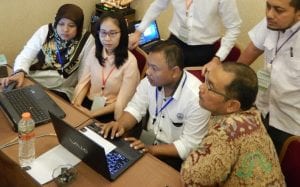With a booming population experiencing rapid economic development, Indonesia faces numerous social and environmental challenges. The archipelago must address its issues sustainably, one step at a time, and there is no better way to start than with access to knowledge. As Kofi Annan once said, “Knowledge is power, information is liberating.” Today’s global economy thrives on the quantity, quality, and accessibility of information, making knowledge the new currency by which nations maintain economic competitiveness and global prosperity.
With this in mind, Indonesia is dedicated to a strong foundation of knowledge. The country hosts a whopping 4,000 universities, 500 research institutes, and 600 governmental research departments. These institutions publish a combined 7,000 academic journals and millions of research papers every year (all of which can be viewed in Indonesia’s ISSN registry). Compare this to Australia, for example, which publishes only 264 journals in comparison. The disparity is mainly due to a regulation issued in 2012 by Indonesia’s Ministry of Research, Technology and Higher Education that makes it compulsory for every Indonesian researcher, academic, and student to publish their research results or theses in an academic journal. Because of the difficulty of publishing Indonesian-language papers in reputable international journals, universities and government bodies responded by issuing their own local journals – resulting in the 7,000+ journals we see today. However, accessibility to that knowledge remains a problem.
Currently, only 2,000 of Indonesia’s 7,000 journals are available online, meaning most of their research is essentially undiscoverable. This effect is magnified for international researchers or those based in rural areas. Such limited readership means, no matter how valuable, Indonesia’s research has a low impact on government policy and accountability.
Although there is no clear solution to this problem, there remains a need for an online platform for Indonesian data – one that helps both curate online journals and digitalise print journals. Grassroots initiatives to date, such as Portal Garuda and MoraRef, have focused on curating existing online content, but perhaps the best solution for taking Indonesian research from offline-to-online comes from Neliti. Headquartered in Jakarta, Neliti aims to digitalise Indonesia’s entire research industry – 122,000 libraries and 7,000 academic journals. Through the online portal, institutions are able to create their own repositories and journals where they can upload journal articles, raw data, books, and research reports. It is the only service that curates data in edition to journals – thus making a sizeable contribution to Indonesia’s open data endeavours.
Although Neliti is still young, its impact on access to information to Indonesia is already being felt. There are obvious benefits to Indonesia’s development goals: everyone can access data regardless of their background or rurality, and important research is more likely to reach the ears of policymakers and international readers. Neliti already hosts 50,000 academic publications, 900 academic journals and 400 online libraries from universities, think tanks and government departments alike. They could, in theory, become the biggest online host of research in the developing world, and aspire to disrupt other developing markets. Time will only tell the impact that Neliti and similar project make, however, if successful it may provide a replicable open data initiative for other developing economies such as China, India, Brazil and Nigeria.
If you would like to contribute an article or contact our contributors, you can get in touch here

